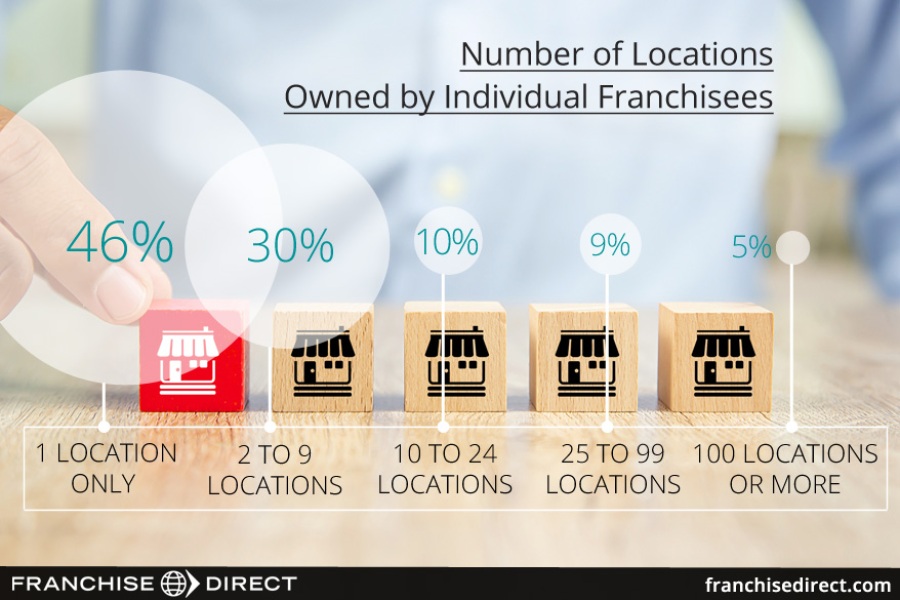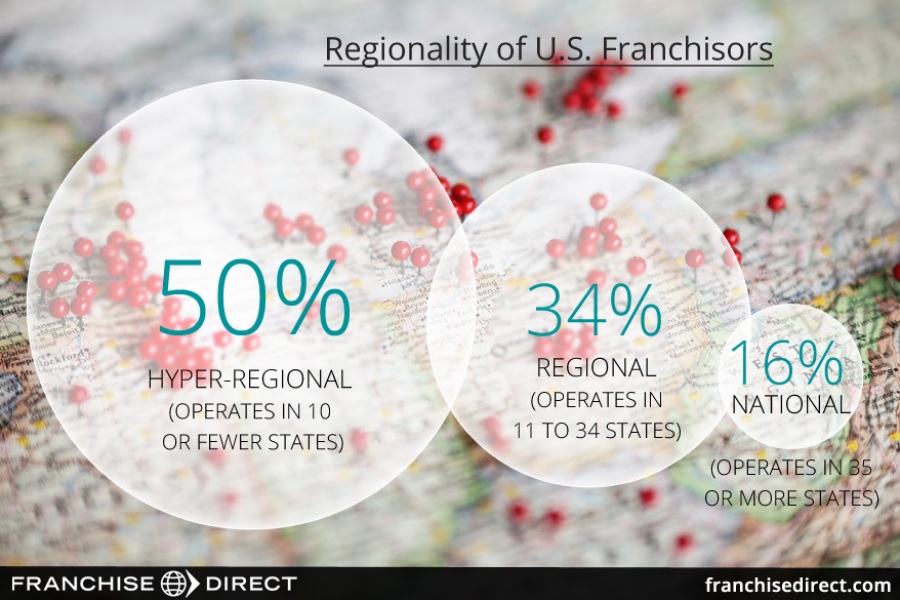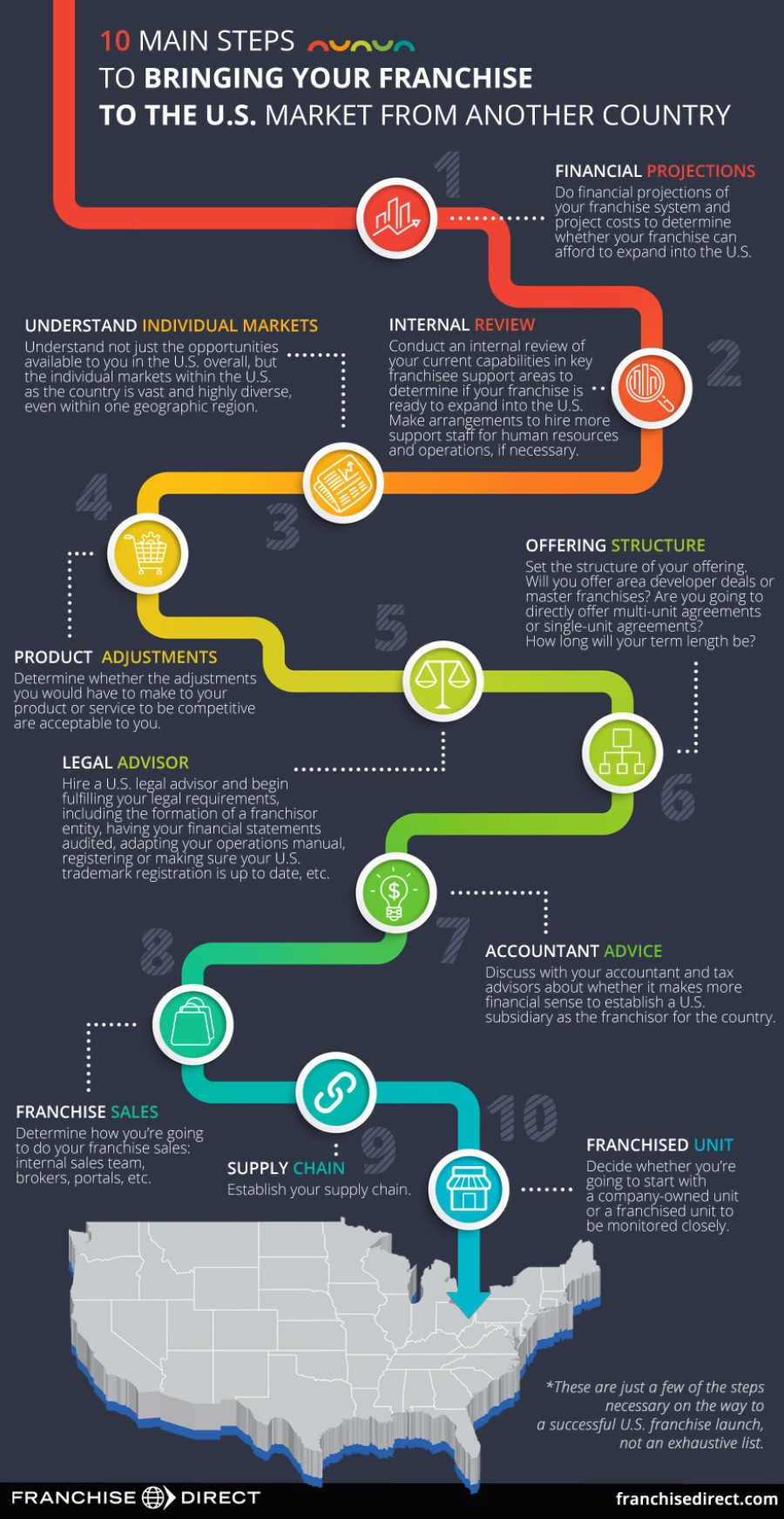🕒 Estimated Reading Time: ~6 minutes

U.S. Franchising at a Glance
The U.S. franchise industry is the largest, most well-developed franchise industry in the world. With origins dating back into the 1800s, it boasts approximately 780,000 establishments (as of mid-2020).
Additionally, here are some other facts about the U.S. franchise industry, per FranDATA and the International Franchise Association:
- U.S. franchises represent 3% of the gross domestic product (GDP) for the country.
- In 2019, franchises produced an estimated $787.5 billion in economic output.
- The U.S. franchise industry employs about 8.4 million people directly.
- The three largest franchise sectors by economic output are: quick service (fast food) restaurants, retail (food, products & services), and business services.
- The 10 states with the most franchise establishments, as of January 2020, are: California, Texas, Florida, New York, Illinois, Ohio, Georgia, North Carolina, Pennsylvania, and Michigan.
In the U.S., franchising is a bit of a paradox. As noted above, it’s a big, impactful industry. Yet, at the same time, it’s still largely a small business game. Over 46% of franchise owners only own one location.

Source: FranDATA/Franchise Times
And keeping it small doesn’t just go for franchisees themselves. According to additional statistics from FranDATA, 84% of franchisors operating in the United States have less than 100 total locations total.

When it comes to regionality, half of U.S. franchise brands are hyper-regional, meaning they operate in 10 or fewer states. Franchise brands that are considered regional (operating in 11 to 34 states) account for 34% of U.S. franchises, while those operating nationally (defined as being in 35 or more states) total approximately 16% of franchises.
Legal Requirements to Franchising in the U.S.
In the U.S., the Federal Franchise Rule is the umbrella law for franchise transactions in every state. The Federal Franchise Rule was enacted in 1979.
Under the Federal Franchise Rule, franchisors are required to give prospective franchisees “the material information they need in order to weigh the risks and benefits of such an investment.” The Franchise Disclosure Document (FDD) is a product of this rule.
The FDD is a comprehensive document that outlines the history of the business, fees, rules and restrictions, all the franchisees in a system, turnover rates, renewal terms and other aspects of a particular franchise.
The FDD must be provided to a prospective franchisee no fewer than 14 days before any agreement is signed or money exchanged.
However, the Federal Franchise Rule leaves compliance largely to the franchisors as no federal registration of the FDD is required. But, as an act of consumer protection, several states have taken steps to protect prospective franchisees by enacting state-specific regulations. There are two main ways states regulate franchise offerings: FDD registration and FDD filing.
States that require FDD registration typically have the strictest franchise regulations. According to Charles Internicola, a U.S.-based business and franchise lawyer, FDD registration states treat the FDD much “like a stock or security.” To operate in these states, the FDD must be registered with the appropriate regulation body similar to how a stock must be registered with the Securities and Exchange Commission before public offering.
Beyond the franchise registration states, there are a number of states that require a franchisor to file its FDD with the state before operation. FDD filing is a step below FDD registration. In states with a filing vs. registration status, there is usually some kind of law governing how business opportunities are offered and sold within the state, but not necessarily franchise-specific rules.
For more on the states that require FDD registration or filing, click here.
Expanding Your Franchise into the U.S.
The U.S. franchise industry is ever-growing. Since 2012, an average of about 300 franchise brands have made their debut each year. Currently, more than 3,380 franchise brands are operating in the U.S. The size and scope of the U.S. franchise industry can be intimidating to brands from other countries. But experts say that shouldn’t be the case.
Michael Seid, franchise consultant and co-author of Franchising for Dummies, says “Entering the U.S. market may not be the right move for every company, but the reason for not coming to the U.S. should be based on solid business reasons—there is no reason to stay away because of fear.”
To that point, here are some reasons the U.S. franchise market is attractive to foreign franchisors:
- Strong business regulation and brand protection
- Pre-existing consumer familiarity with franchised concepts
- Large potential labor and management pool
- Traditionally good access to capital and financing for franchisees
- Well-defined industry processes for recruiting franchisees
As with expansion to any country, there are a number of things foreign franchisors should evaluate before making the jump into another national market. Below are 10 main steps franchisors should take before entering the U.S. franchise market. These actions are based off of suggestions given by Seid in a published editorial on bringing franchise concepts to the U.S. Remember, these are just a few of the steps necessary on the way to a successful U.S. franchise launch.
- Do financial projections of your franchise system and project costs to determine whether your franchise can afford to expand into the U.S.
- Conduct an internal review of your current capabilities in key franchisee support areas to determine if your franchise is ready to expand into the U.S. Make arrangements to hire more support staff for human resources and operations, if necessary.
- Understand not just the opportunities available to you in the U.S. overall, but the individual markets within the U.S. as the country is vast and highly diverse, even within one geographic region.
- Determine whether the adjustments you would have to make to your product or service to be competitive are acceptable to you.
- Hire a U.S. legal advisor and begin fulfilling your legal requirements, including the formation of a franchisor entity, having your financial statements audited, adapting your operations manual, registering or making sure your U.S. trademark registration is up to date, etc.
- Set the structure of your offering. Will you offer area developer deals or master franchises? Are you going to directly offer multi-unit agreements or single-unit agreements? How long will your term length be?
- Discuss with your accountant and tax advisors about whether it makes more financial sense to establish a U.S. subsidiary as the franchisor for the country.
- Determine how you’re going to do your franchise sales: internal sales team, brokers, portals, etc.
- Establish your supply chain.
- Decide whether you’re going to start with a company-owned unit or a franchised unit to be monitored closely.















